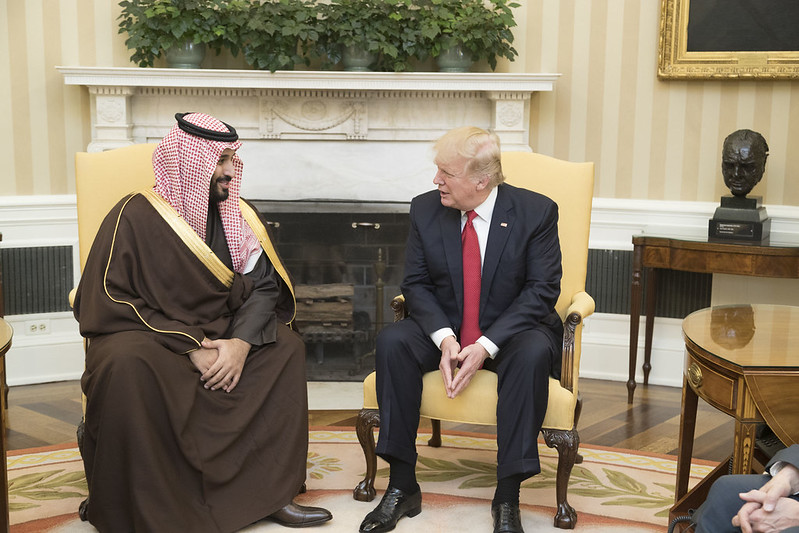Time to Get a Handle on America’s Conduct of Proxy Warfare
In the past decade, proxy warfare has become a major challenge to global stability. What are the gaps in the current toolkit to regulate proxy wars?

Published by The Lawfare Institute
in Cooperation With

In the past decade, proxy warfare has become a major challenge to global stability. In fact, in nearly every major conflict of the 21st century—civil wars in Syria, Yemen and Libya; U.S.-initiated wars in Iraq and Afghanistan; ongoing conflicts in Somalia, the Democratic Republic of Congo and eastern Ukraine—proxies have featured prominently. Yet, as an expert working group convened by the American Bar Association (ABA) Center for Human Rights found, the international community lacks sufficient tools to regulate proxy warfare. What’s more, the currently available accountability mechanisms are insufficient to ensure that the United States—one of the world’s most visible and robust sponsors of proxy groups—complies with its obligations under international law when using proxies. As the release of the Afghanistan papers in December 2019 demonstrated, the failure of the United States to address the corrupt and/or predatory practices of its foreign partners can doom U.S. military operations in the long term. Here, we dive into the themes that animate the ABA paper. What are the threats of proxy warfare and the gaps in the current enforcement toolkit?
The Nature and Risks of Proxy Warfare
The Expert Working Group of the ABA Center for Human Rights examined the international legal framework regulating proxy warfare. That study, as outlined below, identified a number of ways in which the United States leads efforts to ensure partners’ compliance with international law but also identified several areas in which the United States could improve its performance.
For the purpose of the study, the Expert Working Group defined proxy warfare to include situations in which state actors support armed third parties whether state or non-state actors—to engage in hostilities as a means to achieve the supporting state’s objectives. Some commentators prefer terms such as “indirect” or “surrogacy warfare,” or military operations “by, with, and through” partners. These differences in terminology stem in part from disagreements around the precise nature of proxy warfare. Some understand the term to imply a principal-agent relationship in which the sponsor exerts substantial control over the behavior of its proxy, while others argue it encompasses a broader set of relationships in which one party supports another party engaging in hostilities. In practice, however, the Expert Working Group found that sponsors rarely exert substantial control over proxy behaviors; rather, proxies nearly always operate according to their own distinct interests, leadership prerogatives and internal pressures.
The Expert Working Group and this post take the term “proxy warfare” to cover relationships in which a sponsor provides support to another party with a specific intent that the party will carry out activities to advance the sponsor’s objectives in armed hostilities. The study also examined how security partnerships of different kinds impact proxy warfare. For example, the United States is supporting combat operations in Yemen that are part of a broader proxy war between Iran and Saudi Arabia. U.S. support for the Saudi-led coalition does not necessarily make the coalition a proxy of the United States. Indeed, the government of Saudi Arabia has its own agenda in Yemen and does not operate under the direction and control of the United States. Regardless of whether the United States maintains control over the parties to the conflict, international law dictates that the United States may still bear responsibility for any wrongful acts by parties to the conflict to which it is providing support.
Some observers may balk at the idea that proxy warfare includes sponsorship of state security forces. But any analysis that does not look at both state-to-state relationships and state support of non-state actors would fail to capture the full picture of what drives proxy warfare. Research has shown that “in the 114 civil wars between 1946 and 2002 where at least 900 people were killed, no rebel group was transferred major conventional weapons without the government also receiving arms from another source.”
A key characteristic of proxy warfare then is the escalatory dynamic between two parties—typically the state and insurgents—that are both supported by foreign powers. Many of the longest running and most deadly internal armed conflicts have become intractable in part because foreign actors are involved that support opposing sides of the conflict.
Syria provides a powerful example of the tendency that proxy warfare has to attract additional parties to conflicts and create escalatory cycles between parties. Sponsors including the United States, Iran and Russia have reacted to other state powers sponsoring various parties to the conflict by increasing their own investments and sustaining or increasing the numbers of armed combatants despite significant attrition.
Sponsorship of proxy groups has become a feature of nearly every global conflict. Four of the world’s six largest arms suppliers—the United States, Russia, France the United Kingdom, which together account for over 70 percent of global weapons sales—are known to have supported both state and non-state armed groups in current or recent conflicts. Meanwhile, armed groups themselves have proliferated: More armed groups have emerged in the past six years than in the past six decades.
The involvement of sponsors hardly makes conflict more abbreviated or more restrained. Research suggests that foreign intervention in internal armed conflicts, on average, makes conflicts longer. Proxy warfare also impacts the nature of conflicts. It increases the likelihood of atrocities and other civilian harms. Armed groups with access to external resources—whether provided by outside parties or natural resources—are less likely to need the support of local populations and may therefore be more likely to engage in atrocities.
Proxy warfare also creates protracted challenges in establishing the rule of law and a state monopoly on violence in postconflict settings. For one thing, weapons provided to proxies are difficult to track and can be easily diverted to unintended recipients. As the U.S. experience in Afghanistan has demonstrated, such diversion can fuel a corrupt war economy that strengthens individual strongmen—tribal, rebel or ideological leaders who are using the war to improve their personal standing.
Research about the dangers of proxy warfare has prompted some countries, such as the United States, to develop safeguards to prevent abuses or strategic surprise caused by their proxies. Yet the Expert Working Group’s evaluation found that policymakers appear to favor largely short-term considerations (for example, limiting large-scale commitments of their own troops, maintaining deniability or tending to alliance management), while neglecting the risks laid out above. Research doesn’t support this calculation. Evidence and experience suggest the negatives of proxy warfare occur with far greater frequency than the frequency with which state sponsors achieve their desired objectives. But the tendency of states to turn to proxy groups nonetheless appears to be increasing.
The Adequacy of International Law
Over the past year, the Expert Working Group examined whether gaps in the law contribute to the adverse impacts of proxy warfare. The Expert Working Group—comprised of policymakers, academics, and lawyers with expertise in both regional and functional areas relevant to the study—ultimately found that the existing international legal framework establishes appropriate legal obligations that bind states to responsible behavior in relation to proxy warfare. What is lacking, however, is an effective set of mechanisms to enforce these obligations.
The international legal framework regulating proxy warfare derives from general principles concerning state responsibility, customary international law, the Geneva Conventions, the Arms Trade Treaty and human rights treaties. This framework sets forth binding rules to constrain state use of force (proportionality, distinction, necessity and humanity). It also establishes the responsibilities of sponsor states for the acts committed by the proxies they support that run afoul of international obligations. The International Law Commission’s draft articles on Responsibility of States for Internationally Wrongful Acts make up a large part of the framework. The International Court of Justice has recognized the articles as an authoritative restatement of customary international law.
Pursuant to Article 8 of the draft articles, the conduct of individuals may be directly attributable to sponsor states where the individuals operate under the direction and control of the sponsor state. In reality, this sets a high threshold that is rarely met in proxy warfare. The Expert Working Group found that instances of sponsor control over these proxies may be rare in practice. Security forces of any type go to great lengths to maintain their independence.
Article 8 does, however, have important implications for private security contractors who are subject to the direction and control of their sponsors through contractual obligations to those sponsors. Sponsor states that employ contractors must take effective steps to ensure their contractors comply with the law, including, but not limited to, prosecuting contractors should they misuse force against civilians.
Under Article 16 of the draft articles—which the International Court of Justice has found to reflect customary international law—a sponsor state can be held responsible for an internationally wrongful act committed by another state if the sponsor state aids or assists that state in the act’s commission, provided that (a) the sponsor does so with knowledge of the circumstances of the internationally wrongful act, and (b) the act would be internationally wrongful if committed by the sponsor state.
This applies to Russian support of the Syrian regime, as well as U.S. and U.K. support of the Saudi-led coalition in Yemen. The Expert Working Group found that in both instances the sponsors provided assistance even though they knew of the circumstances of the internationally wrongful act. Therefore, the sponsor states share responsibility for the serious violations of international law in the respective countries.
These principles of state responsibility apply regardless of whether there is a state of armed conflict and cover acts that are wrongful under both the law of war and human rights treaties. In the context of war zones specifically, Common Article 1 of the Geneva Conventions also requires that states ensure respect for the conventions. The International Court of Justice has interpreted this to mean that states may not provide assistance to state or non-state actors where it is likely and foreseeable that the assistance will support violations of the law of war. This provision is particularly relevant when states support militias and other non-state armed groups. Research indicates that such groups are more likely to commit atrocities when they receive foreign support because foreign support means that militia groups are less dependent on support from the local population. These non-state groups are also less likely to have effective command-and-control or accountability mechanisms. As a result, foreign support of non-state armed groups increases the risk that sponsor states may run afoul of their own legal obligations.
Taken together, these legal standards establish a definite, albeit sometimes ambiguous, set of obligations for state sponsors of proxy forces in order to prevent those proxies from committing law of war violations and to hold sponsor states accountable should such acts occur. The rules are not the problem. The real gap lies in the enforcement of these obligations.
A Bigger Challenge: Enforcement
Individual nations and multinational bodies, such as the European Union and the United Nations, have sought to create mechanisms to support the enforcement of these obligations. The mechanisms can generally be grouped into three categories: safeguards, capacity building and transparency.
Safeguards include the regulation of arms exports; end-use monitoring regimes; laws governing the use, licensing and legal accountability of private security contractors; and other efforts to constrain how sponsor assistance is used by its recipients.
One prominent safeguard mechanism is the Arms Trade Treaty, which prohibits signatories from supplying certain weapons if they would be used in atrocity crimes. The treaty requires sponsor states to perform risk assessments prior to the transfer of weapons. Over 100 states have ratified the treaty, and there is some evidence that the treaty has produced modest improvements in regulation of weapons transfers. For example, several nations have adopted or amended export control policies to comply with Arms Trade Treaty obligations. However, the United States, Russia and China—three of the largest major global arms suppliers—have not ratified the treaty, and U.S. President Trump announced his intention not to seek ratification of the treaty.
Another notable safeguard is the vetting of potential aid recipients to ensure the assistance will not abet atrocities or human rights violations. One example of such a vetting architecture comes from the United States’s regime of “Leahy vetting,” rules that derive from legislation advanced by Sen. Patrick Leahy. Under these laws, the United States cannot fund training for units that are the subject of credible allegations of gross violations of internationally recognized human rights, such as torture or extrajudicial killing. The State Department has dedicated personnel who review classified materials, reports of human rights organizations and press articles to determine who is eligible for training.
The Leahy vetting system is illustrative of both the form vetting may take and the challenges associated with its effective implementation. Leahy vetting has unquestionably prevented U.S. assistance from reaching individual units known to have engaged in atrocities. But it has also created confusion among government officials responsible for administering it, failed to stop assistance from reaching some problematic actors and generated diplomatic challenges with certain partners. Moreover, as one leading scholar, Rachel Kleinfeld has noted, the legislation is “meant to deal with the problem of ‘a few bad apples’ in a force,” rather than systemic challenges. When abuses by U.S. proxies occur as a result of state policy—whether explicit or implicit—vetting of individual units may not serve as a meaningful deterrent to abuses.
As a complement to safeguards, some nations—including the United States—have adopted capacity-building mechanisms. Whereas safeguards are often meant to prevent assistance from reaching bad actors, capacity building is intended to enable recipients to use assistance responsibly. Such mechanisms include training on the proper use of weapons systems and relevant legal obligations Also under this umbrella is broader institutional capacity building to establish or improve partner forces’ capacity to manage forces and materials and to hold their personnel accountable for any abuses.
These mechanisms hold some potential but have so far proved to be largely immature. Training on weapons and legal obligations has not been effective in countries where security forces are engaged in widespread abuses aimed at intimidating the civilian population. Many countries that have received years of training from the United States have shown no sign of improved human rights performance. Why has training failed to change the behavior of proxy forces? One study suggests that countries facing insurgencies are more likely to be characterized by partisan or sectarian capture of the security sector. As such, their interest in self-preservation may depart from the United States’s interest in establishing stability and the rule of law. So, sponsors need to add more conditions to their aid packages. The study concluded that, in addition to providing training and conducting vetting, sponsors should condition ongoing assistance on compliance with the training and relevant legal obligations.
Likewise, tools to build institutional capacity remain underdeveloped and beset by challenges. Recent analysis of the Pentagon’s Defense Institution Building (DIB) programs—which represent the lion’s share of institutional capacity-building efforts targeting security forces—concluded that lack of planning, coordination and evaluation compromised these programs’ effectiveness. Yes, these DIB programs face challenges. But they provide a promising tool to help aid recipients build systems to improve accountability around security assistance. To date, however, few other sponsor states maintain any significant institutional capacity-building mechanism.
Finally, transparency mechanisms serve to advance enforcement of the international legal framework surrounding proxy warfare in two ways. First, these mechanisms subject the activities of sponsor governments to scrutiny by their citizenries and by the international community. This can help to leverage public pressure in support of established norms. Second, the data that such mechanisms generate provides insights that shape an understanding of national and global activities undertaken in support of proxy groups. This type of tracking can improve identification of state support of proxies that is inconsistent with the state’s legal obligations.
A number of transparency mechanisms exist at national and international levels. The Arms Trade Treaty, mentioned above, includes a robust mandate for signatories to report imports and exports of certain types of weapons. This mechanism largely mirrors the voluntary United Nations Register of Conventional Arms reporting mechanism.
European Union members are bound by the European Council’s Common Position on exports of military technology and equipment, which commits them “to strengthen the exchange of relevant information with a view to achieving greater transparency.” And some individual governments—including the United States—maintain transparency requirements in support of national policies or in connection with the International Aid Transparency Initiative, which urges its more than 90 member states to publish information about their foreign aid activities. For example, the United States annually issues a public report on a limited set of advanced weaponry but fails to include all weapons with substantial military utility in these reports. Though each of these mechanisms is useful, their utility is limited both by the extent to which participating nations commit to fully transparent reporting and by the nations’ interpretations of their obligations. In particular, these interpretations tend to vary substantially from country to country.
In light of the challenges associated with each of these types of enforcement mechanisms—safeguards, capacity building and transparency—the Expert Working Group found that improving global governance of state-sponsored proxy warfare depends less on stronger legal frameworks than on improving enforcement of existing policies. It recommended that “states providing assistance to organized armed groups should establish more effective oversight regimes and support the development of multilateral capabilities to monitor compliance with relevant legal obligations,” while also increasing transparency regarding arms exports and establishing stricter parameters governing appropriate assistance to proxy groups.
Of course, the key to meaningful improvements in any of these areas lies in the hands of a small number of governments. Only five countries—four of which are veto-wielding members of the U.N. Security Council—account for 75 percent of all global arms exports. Of these countries, only France and Germany subject themselves to robust enforcement mechanisms through participation in the Arms Trade Treaty, the European Council’s Common Position on exports of military technology and equipment, and domestic export-control regulations (of the so-called P5 group of countries, only France, Germany and Great Britain participate in the Arms Trade Treaty). But the United States, by far the world’s largest arms exporter and a profligate sponsor of proxy forces, stands out with significant gaps in its enforcement approach.
Russia and China account for a large portion of the remaining exports. Their lack of adherence to international standards also contributes to a race-to-the-bottom approach. While their intransigence is often cited as a reason for NATO members to continue to export arms to unscrupulous actors, the fact remains that NATO members control the majority of the market and could raise standards if they made a concerted effort. Recent commitments by the G-7 to link the provision of support to parties to armed conflict with compliance with the laws of armed conflict, if implemented, would be a good step forward.
Getting a Handle on U.S. Proxy Warfare
Aligning U.S. practice with international legal regimes and norms regarding state sponsorship of proxy forces is squarely within U.S. interests. Alignment contributes to international stability by managing escalatory pressures and limiting sources of strategic surprise, strengthening the rules-based order, supporting conflict resolution, and preventing diversion of weaponry to terrorist groups and other insurgents. Moreover, U.S. commitment to these laws and norms helps build an international consensus that can restrain the behavior of noncompliant states, such as Russia. This could ultimately reduce a potential asymmetric advantage for the United States’s competitors. So what must the United States do to shore up its proxy governance? Improvements are needed across all three areas of enforcement.
In terms of safeguards, it should be a no-brainer for the United States to ratify the Arms Trade Treaty. Second Amendment advocates have argued that the treaty will impose gun controls that undermine the constitutionally protected rights of gun owners. In actuality, the treaty requires no changes to existing U.S. law and focuses on preventing the diversion of arms to illegitimate actors rather than curbing legitimate trade. U.S. participation would demonstrate leadership and exert pressure on Russia and China to follow suit.
In addition, the U.S. must reconsider policies governing aid termination in the event of recipient violations. Currently, under Leahy laws, assistance to a unit that commits gross human rights violations must be terminated. However, as shown by the government’s failure to terminate assistance to Saudi Arabia in the wake of violations in Yemen, the requirement is subject to a significant number of loopholes.
For example, equipment transfers are subject to Leahy vetting only if the equipment is purchased with U.S. funds. Leahy laws provide that no “assistance” shall be provided to foreign security forces. While other provisions of the Foreign Assistance Act define “assistance” to include licenses for the sale of defense articles and services, for the purpose of Leahy vetting, the State Department interprets this term to apply only to U.S.-funded transfers of such articles and services. In other words, if the recipient country uses its own funds to purchase defense articles or services from a U.S. company, such sales are subject to State Department approval but not to Leahy vetting. And the general State Department process is more lenient than Leahy vetting—the State Department authorizes tens of billions of dollars of such sales annually. In the case of Yemen, Leahy vetting did nothing to prevent the ongoing sales of munitions to the Saudi-led coalition even amid credible reports that U.S.-origin munitions had been used in unlawful airstrikes. The loophole? The munitions were purchased by Saudi Arabia and other members of the coalition, not by the U.S.
The U.S. also has an enforcement problem. While U.S. law already prohibits the provision of military assistance to governments engaged in a consistent pattern of abuses or to recipients with a record of misuse of U.S.-origin defense articles or services, the United States has failed to enforce these laws. That must change. The U.S. should establish firm requirements that mandate that (a) reports of significant violations by recipients of military aid must be jointly investigated, (b) these joint investigations should trigger termination decisions that, in the absence of exculpatory evidence, treat the best available evidence from credible, independent sources as dispositive, and (c) in addition to termination of assistance to specific units for human rights violations, the U.S. should end assistance to governments demonstrating a sustained pattern of unaccountable violations.
More can be done at a programmatic level to establish safeguards. Assistance programs should be informed by risks assessments, thorough vetting of recipient units and the incorporation of risk mitigation measures into program designs. In terms of vetting, improvements to Leahy vetting in recent years—such as the establishment of a remediation policy—have strengthened the program and addressed key concerns. However, the program has always been challenged by a lack of quality data. The U.S. intelligence community, including national and military programs, is uniquely positioned to help improve access to available data for Leahy vetting. The United States should incentivize collection of intelligence on human rights violations, gross misconduct, and corruption through the National Intelligence Priorities Framework and other tools.
A final priority for improving safeguards must be to ensure the accountability of private security contractors. More than a decade after Blackwater contractors massacred Iraqi civilians in Baghdad’s Nisour Square, the ability of the U.S. government to hold contractors in its employ accountable for unsanctioned violence remains inconsistent. While one of the contractors involved in the Nisour Square killings was convicted of murder, current law does not generally establish extraterritorial jurisdiction over U.S. contractors who have no role in supporting U.S. military operations. Legislation such as the Civilian Extraterritorial Jurisdiction Act—long championed by Rep. David Price and Sen. Leahy—would establish clear U.S. criminal jurisdiction over all U.S.-employed security contractors.
In terms of capacity building, the Expert Working Group recognizes human rights training as an important mitigation measure to accompany assistance to proxy groups, and the U.S. should invest in improving infrastructure and expertise to deliver this training. The current approach is limited largely to delivery of seminars on international law of armed conflict and other legalistic training by Judge Advocate General personnel working through the Defense Institute for International Legal Studies. These activities may be an important element of a broader human rights training approach. But on their own, they are insufficient. Instead, the U.S. should establish a coherent program of cross-spectrum training that includes legal, doctrinal and tactical aspects. This training would range from classroom seminars to scenario-based shoot-house exercises. Aid should be contingent on a demonstrated ability to use the U.S. funds or arms in a manner consistent with the law. And ongoing aid should be suspended if the recipient misuses it.
The U.S. has taken some important steps toward improving transparency of military assistance in recent years, including participation in the International Aid Transparency Initiative and the Open Government Partnership, but some important holes remain. In particular, since Sept. 11, 2001, the number of U.S. special operations forces personnel has grown dramatically. In 1999, there were 29,500 and now the number has ballooned to over 65,000. Special operations forces have concomitantly expanded their presence around the world. Why is the growth of these forces an obstacle to transparency? In 2016, special operations forces were deployed to 138 countries; though they are charged with a variety of missions, they often provide assistance to domestic counterparts, including activities that sometimes involve proxy warfare. Yet, the locations and missions of, and assistance provided by, these forces almost always remains classified. Special operations authorities, such as 10 U.S.C. § 127e and the Joint Combined Exchange Training program are not subject to the same safeguards—including congressional oversight—as other Defense Department-administered security cooperation programs, much less those safeguards that apply to State Department-administered security assistance programs. Given the lack of safeguards, congressional oversight and transparency is particularly important for these programs
In reality, while special operations forces missions can include highly sensitive state secrets, often they do not. Transparency requirements should be revised to eliminate blanket exemptions for special operations forces activities, while maintaining options for keeping secrets classified. It’s not impossible for the Department of Defense to strike a balance. Absent such a middle ground, the American public—and often Congress—remains in the dark about a broad array of potentially risky operations that could entail U.S. aid to groups that violate international law, significantly impact American interests and draw U.S. service members into armed conflicts not authorized by the Congress.
Conclusion
In the more than 15 years that the United States has been engaged in military operations in Iraq and Afghanistan, creating effective and accountable local security forces has been a critical component of U.S. strategy. Yet, after hundreds of billions of dollars in U.S. funds invested in building the capacity of these local forces, neither country is able to effectively deny safe havens to terrorists on its own. Local forces sponsored by the U.S. in both countries have failed to secure the support of people in the respective countries. The major obstacle: corrupt and abusive practices.
To take just one example, in 2006, the Independent Commission on the Security Forces of Iraq concluded that the federal police (then referred to as the national police) were engaged in sectarian abuses and should be disbanded. They never were. Rather, the Defense Department continued to request funding for the federal police through 2019. The federal police have hardly reformed themselves. In late 2019, the federal police were involved in the unlawful killing of protestors in Iraq. This should be a wake-up call to the United States that, whatever their short-term benefits, proxies that disregard the rule of law will never bring long-term stability to the countries in which they operate. By complying with its own legal obligations for sponsoring proxies, and implementing the recommendations outlined above, the United States may avoid such failures in the future.






